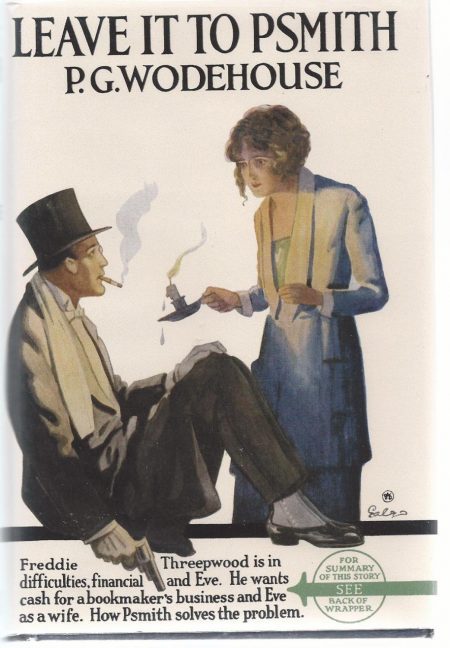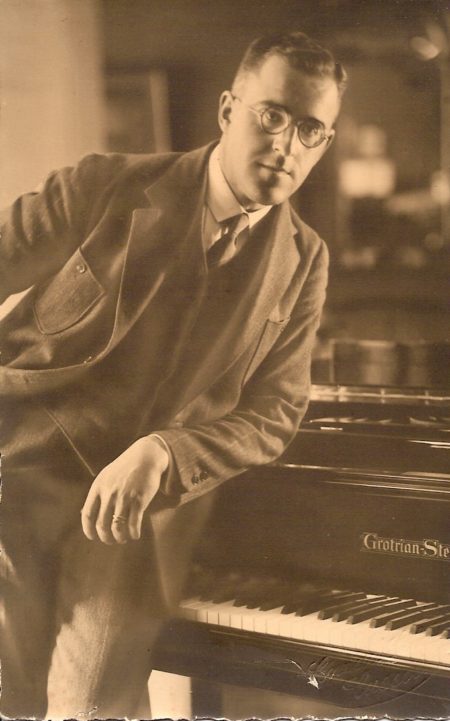LEAVE IT TO PSMITH (28)
By:
July 27, 2019

Leave It to Psmith (1923) is the last and most rewarding of four novels featuring the dandy, wit, and would-be adventurer Ronald Eustace Psmith, one of P.G. Wodehouse‘s most popular characters. (“One can date exactly,” Evelyn Waugh claimed, in reference to Psmith’s debut in the 1909 novel Mike, “the first moment when Wodehouse was touched by the sacred flame.”) Leave It to Psmith‘s copyright enters the public domain in 2019; HiLoBooks is pleased to serialize this terrific book here at HILOBROW. Enjoy!

“What has Baxter been doing?”
“Only giving the whole bally show away to me, that’s all,” said Freddie feverishly. He clutched Psmith’s arm violently, causing that exquisite to utter a slight moan and smooth out the wrinkles thus created in his sleeve. “Listen! I’ve just been talking to the blighter. I was passing the library just now, when he popped out of the door and hauled me in. And, dash it, he hadn’t been talking two seconds before I realized that he has seen through the whole damn thing practically from the moment you got here. Though he doesn’t seem to know that I’ve anything to do with it, thank goodness.”
“I should imagine not, if he makes you his confidant. Why did he do that, by the way? What made him select you as the recipient of his secrets?”
“As far as I can make out, his idea was to form a gang, if you know what I mean. He said a lot of stuff about him and me being the only two able-bodied young men in the place, and we ought to be prepared to tackle you if you decided to start anything.”
“I see. And now tell me how our delightful friend ever happened to begin suspecting that I was not all I seemed to be. I had been flattering myself that I had put the little deception over with complete success.”
“Well, in the first place, dash it, that damn fellow McTodd — the real one, you know — sent a telegram saying that he wasn’t coming. So it seemed rummy to Baxter bang from the start when you blew in all merry and bright.”
“Ah! That was what they all meant by saying they were glad I had come ‘after all’ — a phrase which at the moment, I confess, rather mystified me.”
“And then you went and wrote in the Peavey female’s autograph book.”
“In what way was that a false move?”
“Why, that was the biggest bloomer on record, as it has turned out,” said Freddie vehemently. “Baxter apparently keeps every letter that comes to the place on a file, and he’d skewered McTodd’s original letter with the rest. I mean, the one he wrote accepting the invitation to come here. And Baxter compared his handwriting with what you wrote in the Peavey’s album, and, of course, they weren’t a damn bit alike — and that put the lid on it.”
Psmith lit another cigarette and drew at it thoughtfully. He realized that he had made a tactical error in underestimating the antagonism of the efficient one.
“Does he seem to have any idea why I have come to the castle?” he asked.
“Any idea? Why, dash it, the very first thing he said to me was that you must have come to sneak Aunt Connie’s necklace!”
“In that case, why has he made no move till today? I should have supposed that he would long since have denounced me before as large an audience as he could assemble. Why this reticence on the part of genial old Baxter?”
A crimson flush of chivalrous indignation spread itself over Freddie’s face.
“He told me that too.”
“There seem to have been no reserves between Comrade Baxter and yourself. And very healthy, too, this spirit of confidence. What was his reason for abstaining from loosing the bomb?”
“He said he was pretty sure you wouldn’t try to do anything on your own. He thought you would wait till your accomplice arrived.
“And, damn him,” cried Freddie heatedly, “do you know who he’s got the infernal gall to think is your accomplice? Miss Halliday! Dash him!”
Psmith smoked in thoughtful silence.
“Well, of course, now that this has happened,” said Freddie, “I suppose it’s no good thinking of going on with the thing. You’d better pop off, what? If I were you I’d leg it today and have your luggage sent on after you.”
Psmith threw away his cigarette and stretched himself. During the last few moments he had been thinking with some tenseness.
“Comrade Threepwood,” he said reprovingly, “you suggest a cowardly and weak-minded action. I admit that the outlook would be distinctly rosier if no such person as Baxter were on the premises, but nevertheless the thing must be seen through to a finish. At least we have this advantage over our spectacled friend — that we know he suspects me and he doesn’t know we know. I think that with a little resource and ingenuity we may yet win through.” He turned to the window and looked out. “Sad,” he sighed, “that these idyllic surroundings should have become oppressed with a cloud of sinister menace. One thinks one sees a faun popping about in the undergrowth, and on looking more closely perceives that it is in reality a detective with a notebook. What one fancied was the piping of Pan turns out to be a police whistle, summoning assistance. Still, we must bear these things without wincing. They are our cross. What you have told me will render me if possible warier and more snakelike than ever, but my purpose remains firm. The cry goes round the castle battlements, ‘Psmith intends to keep the old flag flying!’ So charge off and soothe your quivering ganglions with a couple of aspirins, Comrade Threepwood, and leave me to my thoughts. All will doubtless come right in the future.”
From out of the scented shade of the big cedar on the lawn in front of the castle Psmith looked at the flower beds, jaunty and gleaming in the afternoon sun; then he looked back at Eve, incredulity in every feature.
“I must have misunderstood you. Surely,” he said in a voice vibrant with reproach, “you do not seriously intend to work in weather like this?”
“I must. I’ve got a conscience. They aren’t paying me a handsome salary — a fairly handsome salary — to sit about in deck chairs.”
“But you came only yesterday.”
“Well, I ought to have worked yesterday.”
“It seems to me,” said Psmith, “the nearest thing to slavery that I have ever struck. I had hoped, seeing that everybody had gone off and left us alone, that we were going to spend a happy and instructive afternoon together under the shade of this noble tree, talking of this and that. Is it not to be?”
“No, it is not. It’s lucky you’re not the one who’s supposed to be cataloguing this library. It would never get finished.”
“And why, as your employer would say, should it? He has expressed the opinion several times in my hearing that the library has jogged along quite comfortably for a great number of years without being catalogued. Why shouldn’t it go on like that indefinitely?”
“It’s no good trying to tempt me. There’s nothing I should like better than to loaf here for hours and hours, but what would Mr. Baxter say when he got back and found out?”
“It is becoming increasingly clear to me each day that I stay in this place,” said Psmith moodily, “that Comrade Baxter is little short of a blister on the community. Tell me, how do you get on with him?”
“I don’t like him much.”
“Nor do I. It is on these communities of taste that lifelong attachments are built. Sit down and let us exchange confidences on the subject of Baxter.”
Eve laughed.
“I won’t. You’re simply trying to lure me into staying out here and neglecting my duty. I really must be off now. You have no idea what a lot of work there is to be done.”
“You are entirely spoiling my afternoon.”
“No, I’m not. You’ve got a book. What is it?”
Psmith picked up the brightly jacketed volume and glanced at it.
“The Man With the Missing Toe. Comrade Threepwood lent it to me. He has a vast store of this type of narrative. I expect he will be wanting you to catalogue his library next.”
“Well, it looks interesting.”
“Ah, but what does it teach? How long do you propose to shut yourself up in that evil-smelling library?”
“An hour or so.”
“Then I shall rely on your society at the end of that period. We might go for another saunter on the lake.”
“All right. I’ll come and find you when I’ve finished.”
Psmith watched her disappear into the house, then seated himself once more in the long chair under the cedar. A sense of loneliness oppressed him. He gave one look at The Man With the Missing Toe, and having rejected the entertainment it offered gave himself up to meditation.
SERIALIZED BY HILOBOOKS: Jack London’s The Scarlet Plague | Rudyard Kipling’s With the Night Mail (and “As Easy as A.B.C.”) | Arthur Conan Doyle’s The Poison Belt | H. Rider Haggard’s When the World Shook | Edward Shanks’ The People of the Ruins | William Hope Hodgson’s The Night Land | J.D. Beresford’s Goslings | E.V. Odle’s The Clockwork Man | Cicely Hamilton’s Theodore Savage | Muriel Jaeger’s The Man With Six Senses | Jack London’s “The Red One” | Philip Francis Nowlan’s Armageddon 2419 A.D. | Homer Eon Flint’s The Devolutionist | W.E.B. DuBois’s “The Comet” | Edgar Rice Burroughs’s The Moon Men | Charlotte Perkins Gilman’s Herland | Sax Rohmer’s “The Zayat Kiss” | Eimar O’Duffy’s King Goshawk and the Birds | Frances Hodgson Burnett’s The Lost Prince | Morley Roberts’s The Fugitives | Helen MacInnes’s The Unconquerable | Geoffrey Household’s Watcher in the Shadows | William Haggard’s The High Wire | Hammond Innes’s Air Bridge | James Branch Cabell’s Jurgen | John Buchan’s “No Man’s Land” | John Russell’s “The Fourth Man” | E.M. Forster’s “The Machine Stops” | John Buchan’s Huntingtower | Arthur Conan Doyle’s When the World Screamed | Victor Bridges’ A Rogue By Compulsion | Jack London’s The Iron Heel | H. De Vere Stacpoole’s The Man Who Lost Himself | P.G. Wodehouse’s Leave It to Psmith | Richard Connell’s “The Most Dangerous Game” | Houdini and Lovecraft’s “Imprisoned with the Pharaohs” | Arthur Conan Doyle’s “The Sussex Vampire”.
RADIUM AGE SCIENCE FICTION: “Radium Age” is HILOBROW’s name for the 1904–33 era, which saw the discovery of radioactivity, the revelation that matter itself is constantly in movement — a fitting metaphor for the first decades of the 20th century, during which old scientific, religious, political, and social certainties were shattered. This era also saw the publication of genre-shattering writing by Edgar Rice Burroughs, Sax Rohmer, E.E. “Doc” Smith, Jack London, Arthur Conan Doyle, Aldous Huxley, Olaf Stapledon, Karel Čapek, H.P. Lovecraft, Charlotte Perkins Gilman, Yevgeny Zamyatin, Philip Gordon Wylie, and other pioneers of post-Verne/Wells, pre-Golden Age “science fiction.” More info here.
READ GORGEOUS PAPERBACKS: HiLoBooks has reissued the following 10 obscure but amazing Radium Age science fiction novels in beautiful print editions: Jack London’s The Scarlet Plague, Rudyard Kipling’s With the Night Mail (and “As Easy as A.B.C.”), Arthur Conan Doyle’s The Poison Belt, H. Rider Haggard’s When the World Shook, Edward Shanks’ The People of the Ruins, William Hope Hodgson’s The Night Land, J.D. Beresford’s Goslings, E.V. Odle’s The Clockwork Man, Cicely Hamilton’s Theodore Savage, and Muriel Jaeger’s The Man with Six Senses. For more information, visit the HiLoBooks homepage.
